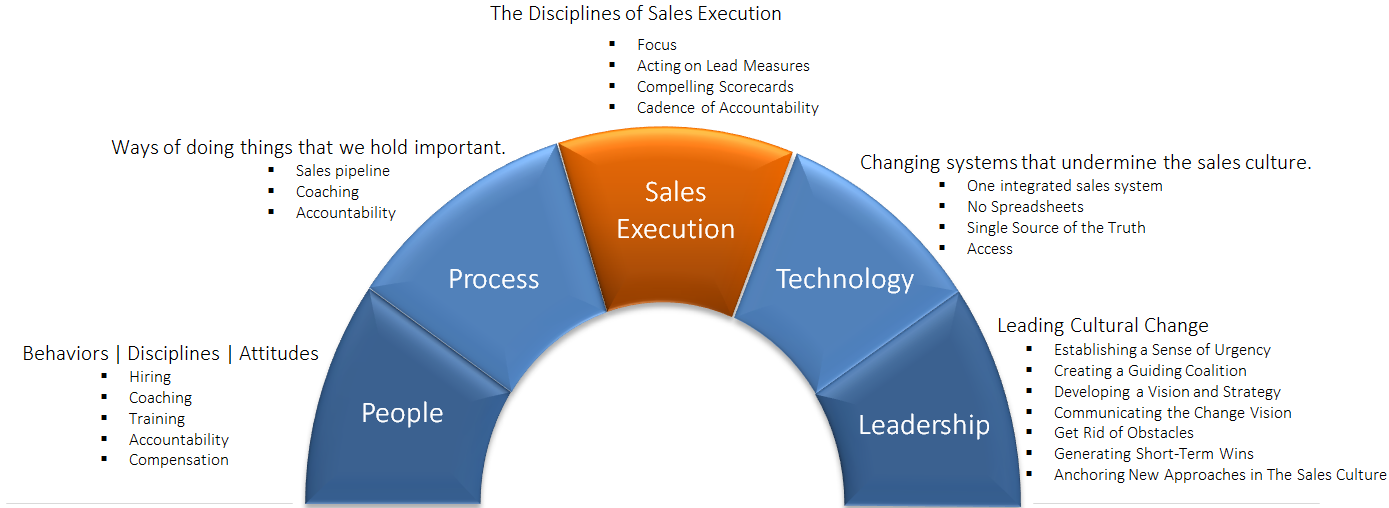How Strong is Your Sales Culture?
A few months ago I was interviewed by Forbes Magazine. Forbes is doing some research and writing an article about sales cultures. Although they were looking at a number of industries, they wanted my perspective on the banking industry. In my client work, I have observed a handful of characteristics that stand out in the best sales cultures. I was eager to learn more about Forbes’ research and exchange ideas.
Forbes Magazine: “How do you define a sales culture?”
There are many definitions. But the best definitions include things like beliefs, practices, ways of doing things, ways of selling, values, common behaviors, habits and disciplines. However, it goes much deeper than that. Developing a sales culture is a long-term process and you must constantly challenge your definition by asking questions like:
- Does our sales culture attract and retain the best employees?
- Does our sales culture add value to the lives of your employees? Are they engaged?
- Does our sales culture attract and retain the best customers?
- Does our sales culture add value to our customer’s lives and businesses?
- What is the attitude of your employees toward their work environment? Are they truly engaged
- How do you define selling? There are still some banks (and most credit unions) who are afraid to use the word ‘sales’. It is almost impossible to develop a sales culture when the word ‘sales’ is forbidden. However, in the best sales cultures, they understand that selling adds value to the lives and businesses of their clients. This is what I refer to as ‘sales calls your customer would be willing to pay for’. This turns out to be a very high hurdle. Gallop’s recent research indicates that only 10% of business decision-makers say they received value from their initial conversation with a banker – and only 17% of those decision-makers give the banker a second meeting.
- Does your sales culture give you a competitive advantage over other banks?
Forbes Magazine: “When you are working with a client, do you have a guideline for developing a sales culture?”
Every bank has a different starting point and a different way of thinking about their sales culture. Some banks have not defined or cultivated a sales culture at all and others I have worked with have been partially successful but need some help. I have a Socratic approach so I am asking questions like:
- Do they manage sales as a process?
In a high performance sales organization the sales process is understood based on the expectations of the bank and clients at each stage of the decision-making process. This enables sales organizations to decode and replicate a vital part of the success of their top performers and provides a roadmap for rapidly getting new hires up to speed and productive.
- Is coaching an imperative?
Few (if any) actually go to school to get a degree in coaching. Gallop’s recent research claims that only 20% of sales managers have the natural talent to fully succeed as a coach – and the others must have formal training. Gallop’s research also indicates that sales performance of any sales team is a direct reflection of how the team is coached – 92% of sales executives believe that the amount sold by a group of sales people is a direct reflection on how well they are coached and not sales skills. The better the coach, the higher the performance. The sales culture must value coaching (people development) and understand how important coaching is.
- Do they manage to the right metrics?
Do they focus on the metrics that matter? While it is important to forecast performance as accurately as possible, doing so rarely (if ever) helps improve sales. In fact, every minute spent reporting or inspecting results (outcome metrics), is a minute lost trying to improve them. In the best sales cultures the best practice is to ‘act of lead measures’ and create some equilibrium between analyzing results (which cannot be managed), and coaching to key performance indicators (acting on lead measures) which are both influence-able and predictive of the outcome.
Think of it this way: achieving your few important goals is like trying to move a giant rock. Despite all the energy your sales team exerts, it doesn’t move. It is not a question of effort. If it was simply about effort, the sales team would have already moved the rock. The problem is that effort alone is not enough. Lead measures act like a lever, making it possible to move the rock. Consider two primary characteristics of a lever. First, unlike the rock, the lever is something you can move – it is influence-able. Second, when the lever moves, the rock moves – it is predictive.
- Do they focus on sales strategy or sales execution?
Banks like to promote their strategies. However, sales success is 80% execution and 20% strategy. Sales execution must be part of every bank’s sales culture. It is the missing link between aspirations and results. As such, execution is a major – indeed, the major – job of a sales leader. If you don’t know how to execute, the whole of your efforts as a leader will always be less than the sum of its parts. Executing strategic goals is the greatest challenge facing sales cultures today. Aligning the sales organization with sales objectives is a never-ending battle. In addition, keeping sales teams engaged and focused on the most important goals is critical. When we initially engage with a client, sales execution is almost totally broken-down in four ways:
- People and teams don’t know their goals. There are too many goals or the goals are not clearly defined.
- People and teams don’t know what to do to achieve their goals. They don’t track leading indicators of success and the goals are not translated into day-to-day activities.
- People and teams don’t keep score. Few can tell at any moment if they are on track to achieve their critical sales goals.
- People and teams are not held accountable for achieving their goals. For results, employees need a cadence of expectations, accountability and feedback – provided by the sales coach.
Forbes Magazine: “Do you recommend a formal framework for high performing sales cultures?”
As I mentioned previously, developing a sales culture is a long-term process. Great sales leaders don’t set out to create a sales culture from scratch. They build upon, improve or change specific elements of the existing sales culture. ‘Change’ is the operative word. A new incentive plan, sales training, process improvement or installing new technology are all cultural ‘change’ initiatives.
With that said, high performing banks focus on five building blocks of a sales culture. It is my observation that these building blocks are present (and refined) in all great sales cultures. The foundation of every great sales culture is people and leadership. Processes enable and sustain change. Your sales culture needs to include technology but it should not be about technology. Sales execution (not strategy) is the keystone of every great sales culture.
The Building Blocks of a Sales Culture
In conclusion, I would like to talk about change. By far the biggest mistake leaders make when trying to improve (change) the sales culture is to plunge ahead without establishing a positive sense of urgency that change is necessary. Leadership must constantly set priorities and lead specific change initiatives to change the sales culture. John Kotter is the guru of cultural change. I always recommend his book ‘Leading Change’. You asked about a framework. I always use John’s eight-stage framework for creating cultural change with my client engagements. We don’t have time for a lot of detail but here is the eight-stage framework.
- Establishing a sense of urgency.
- Creating a guiding coalition.
- Developing a vision and strategy.
- Communicating the change vision.
- Empowering broad-based action by removing cultural obstacles to change.
- Generating short-term wins.
- Consolidating gains and producing more cultural change.
- Anchoring new approaches in the sales culture.
Please contact Ron Buck if you would like to read the full interview or learn more about building high performing sales cultures, the five building blocks or the eight-stage framework for cultural change.
Ron Buck
480-212-6082
rbuck@smandh.com


